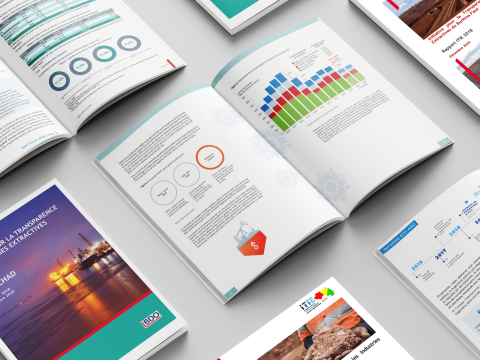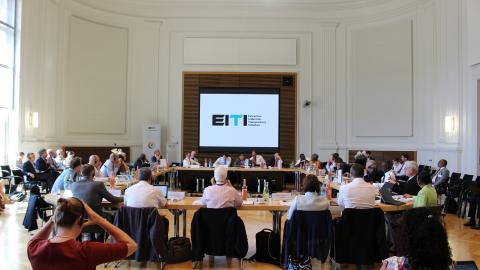
Germany
Overview and role of the EITI
Germany is Europe's largest and the world's fourth largest economy. The country is one of the biggest commodity consumers worldwide, particularly in terms of mineral resources. While generally regarded as a resource-poor country, it has relatively large deposits of lignite, potash and rock salt as well as aggregate materials and soils for the construction industry. Germany also produces some oil and gas, mainly in North Germany and the North Sea.
One of the main issues in Germany’s extractive sector concerns the future of brown coal. The government has formed a multi-stakeholder commission to plan for a sustainable transition to low-carbon energy generation while lessening the impact it has on the mining regions.
Since 2016, Germany has implemented the EITI at the national level with the aim to strengthen dialogue and transparency in raw materials policy. Germany uses the EITI platform to consolidate decentralised information on the extractive sector, highlight the environmental and social rules governing the sector and promote dialogue between the government, civil society and companies.
The report on Germany's extractive sector for the 2021 fiscal year is published on the EITI Germany website.
Economic contribution of the extractive industries
- .02%
- to government revenues
- .82%
- to exports
- .10%
- to GDP
- .19%
- to employment
Innovations and policy reforms
- Germany EITI (D-EITI) has helped inform a change in the Federal Mining Act in 2017, which now allows for public access to mining license information without needing to prove legitimate interest.
- Germany’s EITI Reports, developed by the multi-stakeholder group, go beyond the EITI Standard to include information of public interest, such as environmental protection laws, water usage, state subsidies and renewable energies.
- Germany’s 2020 EITI report now includes for the first time a chapter exploring sustainability in the extraction of natural resources.
- Germany EITI developed an online portal which includes an interactive natural resource data map on extraction quantities in all German federal states in 2019. The portal also presents and updates with each report reconciled figures and links to systematic government disclosures.
- The latest report further developed the country’s new approach to financial transparency quality assurance as part of a pilot project on alternative approaches to EITI reporting based on collating and analysing systematically disclosed data.
Since its inception in 2003, the German government has provided the EITI with the technical, political and financial support of over 30 million euros. Constructive support to the EITI will continue to be an important element of German raw materials policy in the future.
Extractive sector data
Production and exports
Revenue collection
Revenue distribution
Top paying companies
Extractives sector management
Tax and legal framework
Germany’s extractive sector is mainly governed by the Federal Mining Act (BBergG). The sector is primarily regulated by the Federal Ministry for Economic Affairs and Climate Action (BMWK). However, due to Germany’s federal structure, the mining authorities of the federal states implement the Act and bear the responsibility for the authorisation and supervision of mining. Federal states have passed some of their own mining regulations to meet the specific requirements and characteristics for areas not covered by the BBergG. The current coalition agreement foresees a modernisation of the mining law.
Tax administration is split between the Federal Government and the federal states. Depending on the type of tax, it is levied by the financial authorities of the Federal Government, the federal states or the local authorities. One exception to this rule is mine site and extraction royalties, which are levied by the mining authorities of the federal states. Because of stringent tax confidentiality laws, the companies participating in reconciliation need to grant tax authorities an exemption from tax secrecy. The 2020 EITI Report includes information on the amount of tax payments reporting companies made to different municipalities.
Licenses and contracts
For "free-to-mine" natural resources, exploration and extraction rights are granted by the mining authorities of the federal states in a two-stage procedure: firstly, the granting of a mining license (public-law concession) and secondly, the site-specific approval of the operating plan procedure. Extraction rights for natural resources that are privately owned, or the property of landowners are subject to different licensing procedures.
While license information is disclosed in different formats by federal states, Germany EITI publishes consolidated data on mining authorisations. Since 2017 (pursuant to § 76 (3) of the BBergG) the following information on mining rights can be viewed upon request to the mining authorities (without evidence of a legitimate interest):
- Owner
- Extraction sites to which the mining right refers
- Date of the application and granting of the right
- Term
- Natural resource(s) to which the mining right refers
Beneficial ownership
The German government established a beneficial ownership register in 2017 within the framework of the Fourth Anti-Money Laundering Directive (EU) 2015/849. An amending Directive required EU member states’ register of beneficial owners to be made publicly accessible. However, due to the recent European Court of Justice Ruling in the joined cases C-37/20 and C-601/20, which invalidated public access to the register, obtaining information from the register now requires justification and proof of legitimate interest.
Revenue distribution
The distribution of extractive revenues between the Federal Government, the states and the municipalities is regulated by Article 106 of the Basic Law (GG), which distinguishes between "community taxes" and taxes which flow in their entirety to the municipalities, federal states or the Federal Government. The Federal Government and the states are each allocated 50% of corporate tax revenues, which are considered community taxes.
Royalties are redistributed between federal states and the Federal Government. There is no direct sharing mechanism for royalties in Germany, but the general financial equalisation mechanism, that aims to equalise financial power of federal states in Germany, includes royalties in the “income” category of the calculation mechanism.
The Federal Government is entitled to the revenues from electricity and energy taxes. Trade tax, on the other hand, is collected by municipalities in which the relevant operating facilities are situated. A share of the revenues from trade tax is allocated to the Federal Government and the federal states through a redistribution mechanism.
As per the Tax Code, tax revenues from the extraction of natural resources are not earmarked for specific purposes.
EITI implementation
Governance
Germany EITI (D-EITI) is administered by the Germany Multi-Stakeholder Group (MSG). The MSG is chaired by Bernhard Kluttig, Head of the Industrial Policy Department of the Federal Ministry for Economic Affairs and Climate Action (BMWK). His alternate and National Coordinator, Dr. Peer Hoth, is Head of the Division for Mineral Raw Materials and Circular Economy (BWMK). Dr. Franziska Brantner, Parliamentary State Secretary at BMWK, is the EITI champion.
To manage the national secretariat, the BMWK has contracted Germany’s Agency for International Cooperation, the Deutsche Gesellschaft für Internationale Zusammenarbeit (GIZ). This is mainly due GIZ’s longstanding experience with the EITI through technical support in other EITI implementing countries.
Timeline
Germany joined
2016 EITI Report published
Report
Validation
Validation report
2017 EITI Report published
Report
2018 EITI Report published
Report
2019 EITI Report published
2020 EITI Report published
Report
Validation
Germany was found to have made satisfactory progress in implementing the 2016 EITI Standard in May 2019, following its first Validation. See the Validation schedule to learn more about Germany’s upcoming Validation.
Moreover, in June 2020, The EITI Board agreed that Germany made satisfactory progress in implementing EITI Requirement 2.5 on beneficial ownership.






